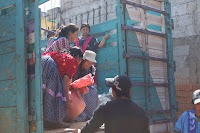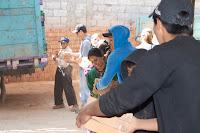The second of two days of materials purchase and distribution was for La Victoria. On June 7th, we had several volunteers and members of the participant families working together to delivery the building materials. Just as in Llanos del Pinal, we stopped to pick up the cooktops, chimney tubes, and sombreros (hats). Up next was about 600 lbs. of barro (clay), 880 bricks, and finally eight 100-pound bags of cement. La Victoria is about 45 minutes northwest of Xela (Quetzaltenango). We met the cinder block truck, which was loaded with 240 blocks, just outside of Esperanza.


The distribution day for La Victoria was a little different compared to our normal distribution methodology in which we go house-to-house to deliver the materials. Because the area is very hilly and some of the homes are not accessible by vehicle, we made three drops for the eight families. One main drop was for six families at a central location; from there the families distributed the materials to their respective homes. All the families were on hand to unload the materials. Blocks and bricks were piled neatly with their planchas and chimneys by their sides, awaiting their final destinations. Happy faces were made happier with a snack and atol (a hot corn-based drink) from the local women. Once the break was over we finished our deliveries to the other two families. It's time to build some stoves!



































